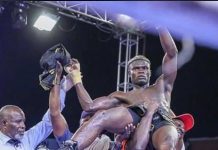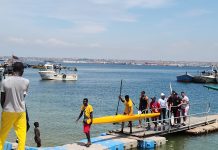Author: Harriet Akosua Frimpomaa Kwakye
“I help my wife to sell her smoked fish and I depend on it to cater for myself and the family anytime the Minister Mrs. Hawa Koomson closes the sea.” Says Nana Agyir.
Not too long, the Minister of Fisheries and Aquaculture Development, Mrs Hawa koomson announced the commencing of this year’s closed season.
The season commenced from Saturday 1st July and is to end on 31st August. Industrial trawlers or fishers whose target catch is demersal fishes like tuna, and inshore fishers whose target catch are small pelagic fishes like Herring, popularly termed as “amane”, are not to fish on the sea shores of Ghana during this period.
The closed season is observed to reduce fishing pressure on fish stocks when they are most productive, this is to allow the fish to lay their eggs to replace the lost population due to fishing and other natural causes.
Over 2 million people who rely on fishing for their livelihoods are affected during the closed seasons. The middlemen are no exception.
Middlemen connect the fishermen to fishmongers and buyers. They buy fish from the fishermen and sell it of to fishmongers and customers at the landing beach.
Nana Agyir is a vibrant dark and tall man in his 40s who lives along the shores of Cape coast in Ghana. He is a Middleman and has been in the industry for almost 22 years. He uses the money he earns to take care of his family.
Though the amount of profits is seasonal and at times the business isn’t productive, he believes that the income he earns is enough to cater for his family.
Nana Agyir temporarily loses his job during the closed seasons because artisanal fishers do not go to the sea to fish. He has no option than to help his wife who sells smoked salmon and Herring.
“It either I go to the cold store and buy fish for my wife or help her to smoke her fish. The money I earn now is not enough to sustain my family during these times”.
Just like Nana Agyir, there are other middlemen who go through unbearable economic hardships during the closed seasons. It either they rent and use tricycles, locally termed as “Okada” or “Aboboyaa” and make money out of it.
To reduce the economic pressure on the people who rely on fisheries for resources, the Ministry of Fisheries and Aquaculture Development and the Ghana Fisheries Recovery Activity has launched the Supplementary Livelihood Training Support for Fishers.
This project aims to train 1350 fishers and fish workers. The beneficiaries are to be trained in masonry, carpentry, dress making, hairdressing and auto engineering. The number of trainees is expected to increased over time.
Though the livelihoods of these middlemen and other fish workers looks miserable in times like these, it is temporal.
The closed season is one of the ways for Ghana to rebuild it’s depleted fish stocks and replenish it dwindling stock. The closing of the sea appears to have to come stay.
Email of writer:
Harrietakosfrimpkwak@gmail.com






































